|
|
|
Sort Order |
|
|
|
Items / Page
|
|
|
|
|
|
|
| Srl | Item |
| 1 |
ID:
174490
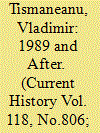

|
|
|
|
|
| Summary/Abstract |
Nations that endured communist dictatorships must come to terms with the traumas of the past before durable democracies can take hold—a lesson the author learned firsthand in Romania.
|
|
|
|
|
|
|
|
|
|
|
|
|
|
|
|
| 2 |
ID:
124321
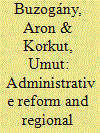

|
|
|
|
|
| Publication |
2013.
|
| Summary/Abstract |
Starting from the empirical observation of high levels of absorption of EU cohesion funds but strikingly low levels of substantive change in regional cohesion, this essay offers a contextual analysis of regional development policies in Hungary. Based on theoretical frameworks dealing with Europeanisation, new regionalism and participative development, it explores the reasons for this observation by analysing the role of administrative and planning structures and of development discourses. The essay shows that the Europeanisation of regional development policy triggered several changes in the planning process and led to the partial inclusion of new actors. However, the main effect of this was a growing centralisation of development policy making. The essay explains this by pointing to the domestic political context and the historical foundations of regional development discourses of the conservative and leftist liberal parties. While there are overlaps between the discourses on both sides of the ideological divide, they are perceived as incompatible by political actors. Thus, it is argued that considerations of political power, rather than ideological nature, shape Hungarian regional and development policy and explain the incremental reform process.
|
|
|
|
|
|
|
|
|
|
|
|
|
|
|
|
| 3 |
ID:
075864
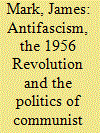

|
|
|
|
|
| Publication |
2006.
|
| Summary/Abstract |
Using oral history, this contribution explores the reshaping of individuals' public and private autobiographies in response to different political environments. In particular, it analyses the testimony of those who were communists in Hungary between 1945 and 1956, examining how their experiences of fascism, party membership, the 1956 Revolution and the collapse of communism led them in each case to refashion their life stories. Moreover, it considers how their biographies played varying functions at different points in their lives: to express identification with communism, to articulate resistance and to communicate ambition before 1956; to protect themselves from the state after 1956; and to rehabilitate themselves morally in a society which stigmatised them after 1989.
|
|
|
|
|
|
|
|
|
|
|
|
|
|
|
|
| 4 |
ID:
029126
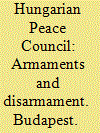

|
|
|
|
|
| Publication |
Budapest, Hangarian Peace Council, 1982.
|
| Description |
253p.
|
| Standard Number |
9630005522
|
|
|
|
|
|
|
|
|
|
|
|
Copies: C:1/I:0,R:0,Q:0
Circulation
| Accession# | Call# | Current Location | Status | Policy | Location |
| 020718 | 327.174/Hungarian 020718 | Main | On Shelf | General | |
|
|
|
|
| 5 |
ID:
128987
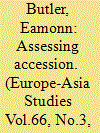

|
|
|
|
|
| Publication |
2014.
|
| Summary/Abstract |
On 1 May 2014, the European Union (EU) celebrated the tenth anniversary of the accession of ten member states-Cyprus, Czech Republic, Estonia, Hungary, Latvia, Lithuania, Malta, Poland, Slovakia and Slovenia. Of these ten new members, eight were Central and East European (CEE) countries that had, for most of the twentieth century, been governed by communist regimes either as republics of the Soviet Union (Latvia, Lithuania and Estonia), satellite states of the Soviet Union (Poland, Hungary, Czech Republic, Slovakia) or as a constituent republic of Yugoslavia (Slovenia). In the subsequent ten years three additional post-communist countries have acceded to the EU (Romania and Bulgaria in 2007 and Croatia in 2013). Commenting on the 2004 EU accession of the first eight former communist countries, the then Irish Prime Minister and President of the European Council, Bertie Ahern, wrote that there was
a particular historical resonance as eight of the former communist countries in the east have emerged from the shadows of the Iron Curtain to join us in working for common goals and for mutual benefit. The artificial divisions, which have blighted our continent's history for so long, are finally being laid to rest.1
|
|
|
|
|
|
|
|
|
|
|
|
|
|
|
|
| 6 |
ID:
168688
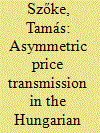

|
|
|
|
|
| Summary/Abstract |
The article compares the market power of Hungarian electricity traders during the partially liberalised transitional market model from 2004 to 2008 and the fully liberalised period lasting since 2008. In our empirical work, we use an econometric modelling technique based on asymmetric price transmission (APT) theory to measure the market power of traders in the electricity market. The aim of our work is to conduct a quantitative analysis of the Hungarian electricity trading market by applying the APT modelling technique – used widely in agro-economic analyses – to electricity markets. The intuition behind the method is the assumption that asymmetric price transmission refers to deviations from perfect competition. The research has found that different regulation regimes lead to different patterns of asymmetry in price transmission and the results underline that the market position of electricity traders have improved since the introduction of the liberalised market model. By mapping the results of the APT model to the actual policy and market changes we argue that the APT method is a useful tool for analysing the competition on electricity markets.
|
|
|
|
|
|
|
|
|
|
|
|
|
|
|
|
| 7 |
ID:
072670
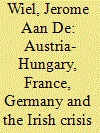

|
|
|
|
|
| Publication |
2006.
|
| Summary/Abstract |
This article examines Ireland's strategic and diplomatic importance for foreign continental European powers in the early years of the twentieth century, a subject much neglected by historians. It focuses on how Austria-Hungary, France and Germany analyzed the Irish crisis between 1899 and 1914. It shows how the pattern of alliances in Europe changed these powers' outlook on Ireland. After the signing of the Entente Cordiale between Britain and France in 1904, the French lost all interest in their relations with Irish separatists. The Germans took over their role as they saw a possibility to break the encirclement of the Triple Entente countries. The article argues that there was a definite 'Irish factor' in the events leading to the outbreak of the First World War, notably in Germany and Austria-Hungary's decision-making process.
|
|
|
|
|
|
|
|
|
|
|
|
|
|
|
|
| 8 |
ID:
133804
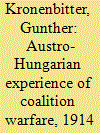

|
|
|
|
|
| Publication |
2014.
|
| Summary/Abstract |
Austria-Hungary's experience of Germany's junior partner was fraught with misunderstandings and a failure to devise a coherent common strategy
While the Anglo-French experience of coalition warfare during the First World War has been the subject of many English-language volumes, Austria-Hungary's relationship with Germany - its senior partner within the Triple Alliance - has been underexplored. In this article, Günther Kronenbitter analyses the uneasy dynamics of this alliance, tracing it through the two countries' wilfully blinkered, thirty-year preparations for a war that eventually came in August 1914, before exploring their increasingly fraught and inadequate efforts to co-ordinate their campaigns and resources - a process marked by resentment and, more importantly, a failure to take a unified strategic approach.
|
|
|
|
|
|
|
|
|
|
|
|
|
|
|
|
| 9 |
ID:
187503
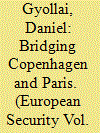

|
|
|
|
|
| Summary/Abstract |
Integrating the discursive and practice-based approach to securitisation, this article explores how the police function as the audience of securitising discourse. Taking the Hungarian case of border control, it looks into how the police accept and buy into anti-immigrant discourses of the political elite. Based on a questionnaire survey of Hungarian police officers, it demonstrates the potential of discursive legitimation in shaping officers’ understanding of mass migration. It describes the ways in which attitudes and hence, arguably, practice can be conditioned by securitising discourse. The overall aim of the article is to advance the understanding of the narrative dimension of power struggles between police and the political elite, and how that structures the field of border security. Critical security scholars have pointed out that police filter securitising discourse based on their professional dispositions and preferences. However, the Hungarian case seems to suggest that discourse may, in fact, influence dispositions themselves.
|
|
|
|
|
|
|
|
|
|
|
|
|
|
|
|
| 10 |
ID:
073657
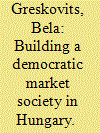

|
|
|
|
|
| Publication |
2006.
|
| Summary/Abstract |
Hungary's ability to become an internationally integrated democratic market society by 2000 was facilitated by its point of departure on this path: politically liberalized reform-socialism. But other factors were crucial as well, such as the lack of violence, the economic and political behavior of transformation's winners and losers, and eu policies. The high fiscal cost of Hungary's foreign-led modernization inevitably creates tensions, but unlike under communism, Hungarians now have a mechanism to express their concerns, by electing a new government. A trial-and-error pattern of political success has thus been established that is likely to remain an inherent feature of its politics.
|
|
|
|
|
|
|
|
|
|
|
|
|
|
|
|
| 11 |
ID:
106280
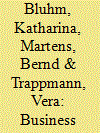

|
|
|
| 12 |
ID:
095091
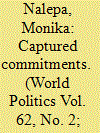

|
|
|
|
|
| Publication |
2010.
|
| Summary/Abstract |
How can outgoing autocrats enforce promises of amnesty once they have left power? Why would incoming opposition parties honor their prior promises of amnesty once they have assumed power and face no independent mechanisms of enforcement? In 1989 autocrats in a number of communist countries offered their respective oppositions free elections in exchange for promises of amnesty. The communists' decision appears irrational given the lack of institutions to enforce these promises of amnesty. What is further puzzling is that the former opposition parties that won elections in many countries actually refrained from implementing transitional justice measures. Their decision to honoring their prior agreements to grant amnesty seems as irrational as the autocrats' decisions to place themselves at the mercy of their opponents. Using an analytic narrative approach, the author explains this paradox by modeling pacted transitions not as simple commitment problems but as games of incomplete information where the uninformed party has "skeletons in its closet"-that is,embarrassing information that provides insurance against the commitments being broken. The author identifies the conditions under which autocrats step down even though they can be punished with transitional justice and illustrates the results with case studies from Czechoslovakia, Poland, and Hungary.
|
|
|
|
|
|
|
|
|
|
|
|
|
|
|
|
| 13 |
ID:
080687
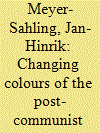

|
|
|
|
|
| Publication |
2008.
|
| Summary/Abstract |
This article examines claims that senior civil services in post-communist Europe are subject to instability and politicisation, and that both features are at the centre of what amounts to the emergence of a distinct type of executive governance different from Western traditions. At the conceptual level, the article develops four modes of politicisation that differ with respect to the political control over the making and breaking of bureaucratic careers. Modes of politicisation serve as an analytical tool to assess and classify the politicisation of post-communist senior civil services and to compare them to prevailing modes of politicisation in Western democracies as well as the communist past. At the empirical level, the article examines the politicisation of the senior civil service in post-communist Hungary. It argues that the politicisation of the Hungarian senior civil service is characterised by high turnover, recruitment of outsiders and heavy reliance on the appointment of officials who come and go with their bloc of political parties while bridging the out-of-office period in the private sector, academia or at a political party. The article concludes that the politicisation of the senior civil service in post-communist Hungary has more in common with the communist past than with the prevailing modes of politicisation in Western democracies. The main difference from the communist era lies in the periodically changing political colours of the post-communist state
|
|
|
|
|
|
|
|
|
|
|
|
|
|
|
|
| 14 |
ID:
101809
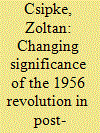

|
|
|
|
|
| Publication |
2011.
|
| Summary/Abstract |
This article explores the changing political uses of the memorialisation of the 1956 revolution in Hungary since 1989, in written history and in public monuments and displays. 1956 was central to the political discourse in 1989; merely 10 years later its anniversary publicly carried the significance of a bank holiday but within a few more years, and especially by the time of the 50th anniversary in 2006, the revolution had become a recurring motif in politics, as the political parties tried to stake their claim as the heirs of 1956. The article illustrates how the 1956 revolution first decreased and then increased in importance over the 20 years following the fall of communism, and how this was a direct result of the ability to use the revolution's memory for political gain.
|
|
|
|
|
|
|
|
|
|
|
|
|
|
|
|
| 15 |
ID:
023594
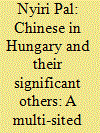

|
|
|
|
|
| Publication |
Jan-March 2002.
|
| Description |
69-86
|
|
|
|
|
|
|
|
|
|
|
|
|
|
|
|
| 16 |
ID:
033136
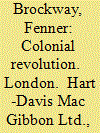

|
|
|
|
|
| Publication |
London, Hart-Davis Mac Gibbon Ltd., 1973.
|
| Description |
654p.Hbk
|
| Standard Number |
0246106050
|
|
|
|
|
|
|
|
|
|
|
|
Copies: C:1/I:0,R:0,Q:0
Circulation
| Accession# | Call# | Current Location | Status | Policy | Location |
| 012857 | 909.8/BRO 012857 | Main | On Shelf | General | |
|
|
|
|
| 17 |
ID:
087696
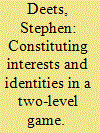

|
|
|
|
|
| Publication |
2009.
|
| Summary/Abstract |
This paper uses the conflict between Hungary and Slovakia over the Gabcikovo-Nagymaros Dam to examine two foreign policy issues. The first is how states determine their interests and how perception of gains and losses arise and change. The second is the reality that international norms are rarely clear and often conflict, making answering questions of whether states have "internalized" or are abiding by norms problematic. This case is a good vehicle for addressing these questions as the dam dispute began during the communist period and has continued through the political and economic transitions to European Union membership. It also was the focus of a groundbreaking International Court of Justice case on the application of ecological necessity to treaty obligations. Fleshing out the model of a two-level game with insights from other theoretical perspectives, this article argues the key to this stalemate is the interrelated process through which state identity and understandings of vital interests change, creating frames in each state around different international norms.
|
|
|
|
|
|
|
|
|
|
|
|
|
|
|
|
| 18 |
ID:
092157
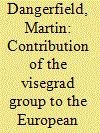

|
|
|
|
|
| Publication |
2009.
|
| Summary/Abstract |
The European Neighbourhood Policy (ENP), launched by the EU in May 2004 as the framework for relations with new Eastern neighbours, looked inadequate before it had even got off the ground. The ENP fell well short of what the Ukrainian 'Orange' politicians expected, was rejected by Russia and also faced a well of criticism from inside the EU.
|
|
|
|
|
|
|
|
|
|
|
|
|
|
|
|
| 19 |
ID:
123226


|
|
|
|
|
| Publication |
2013.
|
| Summary/Abstract |
The Kingdom of Hungary had to face a post-war clutter in 1918-1919. Each center of power tried to establish a kind of armed forces and police in this period. For a long time, Hungary did not have a general staff. Therefore, the Ministry of Defense had an office which worked like general staff, severely 'sub rosa'. Officially the Hungarian General Staff and the branch for intelligence and/or counterintelligence were established in 1938. It had good relationship with its German counterpart and included the Hungarian entity for political investigations. The officials knew which German officer had a Hungarian "connection" and who this person was. It is only a historical quaintness that soldiers or Reichssicherheitshauptamt (Reich Security Main Office [RSHA]) officers and Hungarian police officers joined Office of Strategic Services (OSS) after World War II.
|
|
|
|
|
|
|
|
|
|
|
|
|
|
|
|
| 20 |
ID:
153227
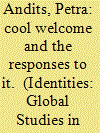

|
|
|
|
|
| Summary/Abstract |
This article examines the social aspects of Australian-Hungarians’ return to Hungary after the collapse of communism. I suggest that one of the most disillusioning aspects of homecoming for this group of Australian-Hungarians was the cold welcome they received from those who had stayed behind. The main task of this article is to analyse how returnees grappled with the negative attitudes of the stayees. Three major strategies are identified by means of which returnees facilitated their feeling of belonging: contestation, acceptance or dismissal of stayees’ perspectives. Returnees’ efforts to achieve a sense of belonging suggest that the nature of national membership is fundamentally fragile and porous and underlines that self-definitions are far from being either unconditional or ascribed. By placing contrasting narratives side by side, this article draws attention to the intersubjective elements involved in defining belonging.
|
|
|
|
|
|
|
|
|
|
|
|
|
|
|
|
|
|
|
|
|